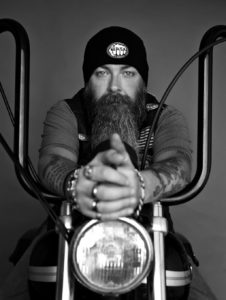
Writer: Barbara Dietrich Boose
Photographer: Paige Peterson
Sometimes angels come covered in tattoos and leather, accompanied by a throaty snarl. Their mission: saving children in peril.
Like the second-grader whose father beats him when he wets the bed. Or the sixth-grader who gets smacked around by her drunken mother. Or the teenager who has been raped by her mom’s boyfriend. Even if abusers leave or are removed from these homes, they may continue to lurk around their victims’ schools and neighborhoods—or the courtroom where a frightened child is expected to testify.
In situations like these where monsters are real, there is an international organization of men and women in black leather astride Harleys, Spyders and Vulcan Nomads who will stop at nothing to help the children: Bikers Against Child Abuse, or BACA.
“BACA members are an incredible source and force of support for abused kids,” says Tracy White, a social work administrator at the Iowa Department of Human Services in Des Moines. “They give kids a tremendous sense of safety and security.”
The first BACA chapter in Iowa was founded in 2009 by Aaron “A Train” Byrd, who had been a BACA member in Kansas City before moving to Des Moines. The first kids the chapter “adopted” had fled their home with their mother in the middle of the night because of abuse by another person living there. Because the chapter hadn’t raised any funds yet, Byrd made a plea for help on a local radio station. Within an hour and a half, he was able to help furnish an apartment that a victims advocate had found for the family.
Equally important, the children had a group of courageous new friends with colorful names—A Train, Sassy, Gonzo, Cracker, Sarge, Hoss, Cherokee and Powder, the chapter’s first members.
“When a child lives in fear, that is our number-one concern, our niche and our single focus—to take away that fear,” Byrd says.
BACA members know each other by “road names,” and they ask the children they serve to choose road names, too. That’s part of biker culture, but the practice serves an additional purpose: Never using a biker or child’s given name reduces the likelihood that an abuser could attack a biker in retribution or follow a biker to find a victim who has moved. (Because of this, some of the BACA members in this article and the accompanying photos are referred to only by their road names.)
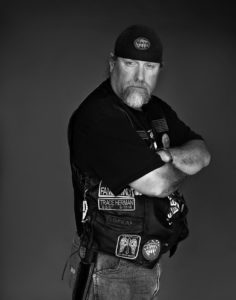
“BACA members [like ‘Hoss,’ pictured here] are an incredible source and force of support for abused kids,” says Tracy White of the Iowa Department of Human Services.How BACA Operates
Here’s how BACA works: When incidents of child abuse have been reported and founded, the victims receive formal social services through the Iowa Department of Human Services (DHS). They also may be told about the informal support of BACA, whose members frequently give presentations to social services agencies, law enforcement groups and other entities to get the word out about the organization. If the child’s caretaker—a non-abusing parent or guardian—is interested in connecting to BACA, the chapter’s child liaison is contacted and a “level one ride” is arranged.
“When families hear about BACA, they’re shocked that DHS would promote something so out of the box,” White says. “That builds credibility for us.”
At the appointed day and time, BACA members roar up to the home, stand as a group and introduce themselves to the child by their road names. They invite the child to choose his or her own road name. The child meets the two designated BACA members whom they can call 24/7. The members then present a BACA vest and a stuffed bear, which they first pass around so that all the bikers can “fill” it with BACA hugs. Depending on the child, they also may exchange fist bumps or hugs.
“We don’t force any type of interaction. Every kid is different,” says Jonathan “PacMan” Taylor, the chapter’s public relations officer. “For some, it takes a few meetings before they’re comfortable, which is understandable. But through the consistency of our being there and giving them support, they’ll open up.”
That dependability is critical for healing kids whose trust in adults “has been compromised for so long,” White says.
“Every single BACA member does what they say they’re going to do. If they say they’re going to show up for a child, they show up,” she adds. “They are true to their word.”
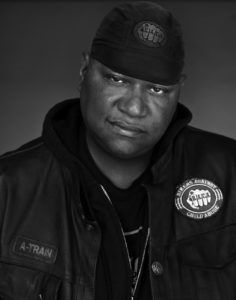
BACA Membership
What BACA emphatically does not do is act as vigilantes who seek out child abusers. They are not baby sitters or referees for family squabbles. Nor does the group extend membership to just anyone with a motorcycle. Those seeking to join must pass federal, state and local fingerprinted background checks to ensure they have no history of perpetrating child abuse or domestic violence. They must attend monthly chapter meetings and other events for a minimum of one year and be unanimously approved by the chapter board to become members.
In addition, an individual member is never alone with a child. Only the chapter’s child liaison knows the children’s real names and basic information about their situations.
“At no point in time do we ask the kids to tell us their stories. They have to tell that to enough other people,” Taylor says. “We are there to lend them our strength until they find their own.”
In addition to visiting the children at home, BACA members may wait outside their counseling appointments or sit silently in the courtroom when a child has to testify. In short, they are present when and where the kids need them.
“One kid played baseball, and the perpetrator would go to the games to threaten him,” White recalls. “So BACA members started going to the games so the child didn’t have to be afraid and didn’t have to worry about his mom.”
BACA members are present with a presence. Their bikes are loud, their leather is black, and they may be long-haired, tattooed, pierced, bandana’d or all of the above.
“When a group of bikers drives up next to you, you roll up your windows and lock the doors. But in the back seat, the faces are pressed up against the glass,” Byrd says. “We’re not on the same path as other motorcycle clubs, but their image allows us to do our job—to empower kids.”
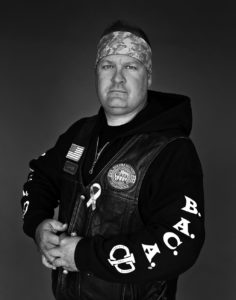
Tightknit Bond
That tough image, the tightknit bond among bikers, and a fiercely shared focus on protecting and uplifting abused kids are evident during a BACA chapter meeting at Immanuel United Methodist Church in Des Moines. Approximately 40 members recite the Pledge of Allegiance and then the BACA creed—which states in part, “I won’t give up, shut up, let up, until I have stayed up, stored up, prayed up, paid up, and showed up for all wounded children”—as well as its mission “to create a safer environment for abused children.”
The mission further pledges BACA’s commitment to working with local and state officials and stipulates that the organization does not “condone the use of violence or physical force in any manner; however, if circumstances arise such that we are the only obstacle preventing a child from further abuse, we stand ready to be that obstacle.”
It is impossible not to fall in love with these people, who in their other lives are chefs and firemen and information technology geeks and teachers and more, but together are a united force. “We would ride into hell for a child,” reads one member’s T-shirt. Another member’s skull-and-crossbones jacket patch states: “Warning: The surgeon general has determined it is hazardous to mess with a BACA child.”
BACA’s white, black and red logo of a tattooed fist encircled by motorcycle chains signifies the innocence of children, the darkness of what some children experience, the blood some shed, the bond among BACA members and the fight against child abuse.
“Children should not have that fear. I believe in the vision and mission and the goal,” says the chapter’s child liaison, who uses the road name Mush. “Kids need to be kids.”

Out of the Dark
Sarge became an early chapter member after A Train handed him a BACA brochure in the parking lot of the former Hooter’s restaurant in West Des Moines. By the time A Train got home, he had a message from Sarge on his phone: “I’m in.”
“When we see a child come out of the dark and feel safe,” Sarge says, “we call those ‘paydays.’ ”
The chapter’s monthly meetings are mostly open to the public. During the meetings they discuss matters such as their budget (generated by fundraisers; no member receives payment for service or gas) and events, including a 100-mile ride each May that BACA chapters worldwide participate in as a fundraiser.
“It happens literally around the world, and it’s meant for members,” Byrd says. “We can get on our bikes and go to a destination where there isn’t a sad child at the end.”
BACA uses its budget to pay for the children’s vests, patches and bears as well as for therapy. Byrd notes that Iowa provides more resources for children and families in need than do many other states, which allows the chapter to include opportunities such as horse-riding lessons and band camp in its definition of therapy.
“One child who had been severely abused by several members of the family had been hitting her foster mom and foster siblings. She’d come up to us and kick us in the shins,”
Byrd recalls. “We got her a punching bag and let her punch away. Her foster mom said that made a big difference.”
The only closed portion of the chapter’s monthly meeting is when members discuss the kids. BACA members have to be mentally steeled to stomach what their young charges have been through, from beatings to repeated rapes by family members. The chapter has access to licensed counseling services for members who need to talk.
“There are some things you can’t unhear,” says Gonzo, the chapter’s new-member liaison.
Whatever they hear, though, BACA members are here—to do whatever it takes to protect and empower abused children.
“There are children in our community who experience horrific domestic violence or sexual abuse,” says White of the DHS. “It is humanly impossible for me to say too much about BACA.”
As A Train puts it: “It sucks that we’re needed, but it’s a good thing we’re here.”
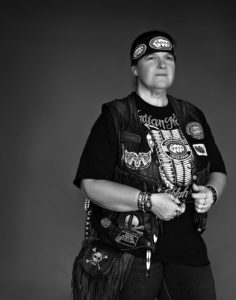
A Mission to Save Children
BACA was founded in the late 1990s by John Paul Lilly, a licensed clinical social worker and professor at Brigham Young University who was working with an abused 8-year-old boy. Lilly knew how the boy felt; he also had been abused as a child but had been befriended by a group of bikers who gave him a road name: Chief. He decided to connect his patient to some bikers he knew, and BACA was born.
The 501(c)3 nonprofit organization now has more than 250 chapters in 49 states and 12 nations, including a new chapter in Iceland. At its annual international conference in Las Vegas—a city selected primarily for its ability to accommodate hundreds of attendees—and in local training sessions and chapter meetings, BACA members keep up on methods for achieving their mission: to create a safer environment for abused children.
“We do not testify against abusers, we do not coach the children—we’re just a physical presence for a child,” says Central Iowa BACA chapter founder and president Aaron Byrd. “Our mission is to be an obstacle against abuse. If you come after the child, you will have to come through every one of us first.”











